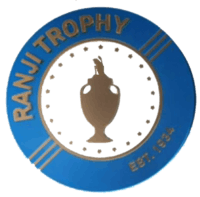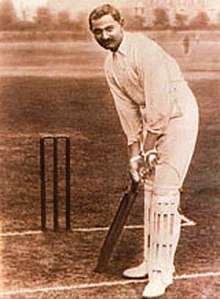Ranji Trophy
The Ranji Trophy is a domestic first-class cricket championship played in India between multiple teams representing regional and state cricket associations. The competition currently consists of 38 teams, with all 28 states in India and four of the eight union territories having at least one representation. The competition is named after the first Indian cricketer who played international cricket, Ranjitsinhji, who was also known as 'Ranji'.
 Ranji Trophy Logo | |
| Countries | |
|---|---|
| Administrator | BCCI |
| Format | First-class cricket |
| First edition | 1934 |
| Tournament format | Round-robin then knockout |
| Number of teams | 38 |
| Current champion | Saurashtra (1st title) |
| Most successful | Mumbai (41 titles) |
| Qualification | Irani Cup |
| Most runs | Wasim Jaffer (12,038) 1996–2020 |
| Most wickets | Rajinder Goel (640) 1958–1985 |
History

The competition was launched in following a meeting in July 1934,[1] with the first fixtures taking place in 1934–35. The trophy was donated by Bhupinder Singh, the Maharaja of Patiala.[1] The first match of the competition was held on 4 November 1934 between Madras and Mysore at the Chepauk ground in Madras in the final. Mumbai(Bombay) have won the tournament the most number of times with 41 wins including 15 back-to-back wins from 1958–59 to 1972–73.
Participants
State teams and cricket associations and clubs with first-class status are qualified to play in the Ranji Trophy. While most associations are regional, like the Karnataka State Cricket Association and Mumbai Cricket Association, two, Railways and Services, are pan-Indian
Current teams
The following 38 teams currently participate in the Ranji Trophy:
- Andhra
- Arunachal Pradesh†
- Assam
- Baroda
- Bengal
- Bihar†
- Chhattisgarh
- Chandigarh
- Delhi
- Goa
- Gujarat
- Haryana
- Himachal Pradesh
- Hyderabad (Telangana)
- Jammu and Kashmir
- Jharkhand
- Karnataka (Mysore)
- Kerala
- Madhya Pradesh (Central India/Gwalior/Holkar/Madhya Bharat)
- Maharashtra
- Manipur†
- Meghalaya†
- Mizoram†
- Mumbai (Bombay)
- Nagaland†
- Odisha (Orissa)
- Puducherry†
- Punjab
- Railways
- Rajasthan (Rajputana)
- Saurashtra (Kathiawar/Nawanagar)
- Sikkim†
- Services (Army)
- Tamil Nadu (Madras)
- Tripura
- Uttar Pradesh (United Provinces)
- Uttarakhand†
- Vidarbha
† denotes newly added teams
Defunct teams
The following teams have appeared in the Ranji Trophy, but no longer do so:
- Central Provinces and Berar (1934/35 – 1949/50)
- Northern India (1934/35 – 1946/47)
- Sindh (1934/35 – 1947/48)
- Southern Punjab (1934/35 – 1951/52, 1959/60 – 1967/68)
- Western India (1934/35 – 1945/46)
- North West Frontier Province (1937/38 – 1946/47)
- Holkar (1941/42 – 1954/55)
- Gwalior (1943/44)
- Kathiawar (1946/47 – 1949/50)
- Patiala/Patiala and Eastern Punjab States Union (1948/49, 1953/54 – 1958/59)
- Eastern Punjab (1950/51 – 1959/60)
- Travancore-Cochin (1951/52 – 1956/57)
- Madhya Bharat (1955/56 – 1956/57)
- Northern Punjab (1960/61 – 1967/68)
Format
From its inceptions until the 2001 season (with the exception of 1948-49 season), the teams were grouped geographically into four or five zones – North, West, East, and South, with Central added in 1952–53. Initial matches were played within the zones on a knock-out basis until 1956–57, and thereafter on a league basis, to determine a winner; then, the five individual zone winners competed in a knock-out tournament, leading to a final which decided the winner of the Ranji Trophy. From the 1970–71 season, the knock-out stage was expanded to the top two teams from each zone, a total of ten qualifying teams. This was expanded again to the top three from each zone in 1992–93, a total of fifteen qualifying teams; between 1996–97 and 1999–2000, the fifteen qualifying teams competed in a secondary group stage, with three groups of five teams, and the top two from each group qualified for a six-team knock-out stage; in all other years until 2001–02, a full fifteen-team knock-out tournament was held.
The format was changed in the 2002–03 season with the zonal system abandoned and a two-division structure adopted – the Elite Group, containing fifteen teams, and the Plate Group, containing the rest. Each group had two sub-groups which played a round-robin; the top two from each Elite sub-group then contested a four-team knock-out tournament to determine the winner of the Ranji Trophy. The team which finished last in each Elite sub-group was relegated, and both Plate Group finalists were promoted for the following season. For the 2006–07 season, the divisions were re-labelled the Super League and Plate League respectively.
In the 2008–09 season, this format was adjusted to give both Super League and Plate League teams an opportunity to contest the Ranji Trophy. The top two from each Plate sub-group contested semi-finals; the winners of these two matches then joined the top three from each Super League sub-group in an eight-team knock-out tournament. The winner of this knock-out tournament then won the Ranji Trophy. Promotion and relegation between Super League and Plate League continued as before. In the 2010–11 season, Rajasthan won the Ranji Trophy after beginning the season in the Plate League.
From the 2012–13 season, this format was adjusted slightly. The Super League and Plate League names were abandoned, but the two-tier system remained. The top tier expanded from fifteen teams to eighteen teams, in two sub-groups of nine (known as Group A and Group B, and considered equal in status); and the second tier was reduced to nine teams in a single group (known as Group C). The top three teams from Groups A and B and the top two from Group C contest the knockout phase. The lowest placed team in each of Group A and Group B is relegated to Group C, and the top two from Group C are promoted to the top tier.
For the 2017-18 season, the two-tier system was abandoned to have 4 groups of seven teams each and two quarter-finalists from each group.
From the 2018-19 season, the teams contested in three-tiers. Five teams will qualify for the quarter-finals from the top tier (known as Elite Group A and Group B). Two teams will qualify from the second-tier (Elite Group C) and One team from the lower-tier (Plate Group) for the quarter-finals.
Round-robin matches are four days in length; knockout matches are played for five days. Throughout its history, if there is no outright result in a Ranji Trophy knock-out match, the team leading after the first innings is the winner.
Prior to the 2016–17 season matches were played at the home ground of one of the two teams taking part. For the 2016–17 competition the BCCI decided that all games would be staged at a neutral venue.[2]
Points summary
Points in the league stages of both divisions are currently awarded as follows:
| Scenario | Points |
|---|---|
| Win outright | 6 |
| Bonus point (for innings or 10 wicket wins) | 1 |
| 1st innings lead in a drawn match | 3 * |
| No result | 1 |
| 1st innings deficit in a drawn match | 1 * |
| Lost Outright | 0 |
Tournament records
| Team records[3] | |||
|---|---|---|---|
| Most wins | 41 | Mumbai | |
| Highest team score | 944/6 dec. | Hyderabad v Andhra | 1993–94[4] |
| Lowest team score | 21 | Hyderabad v Rajasthan | 2010[5] |
| Individual match records[3] | ||||
|---|---|---|---|---|
| Highest individual innings | 443* | B. B. Nimbalkar | Maharashtra v Kathiawar | 1948–49[6] |
| Best innings bowling | 10/20 | Premangsu Chatterjee | Bengal v Assam | 1956–57[7] |
| Best match bowling | 16/99 | Anil Kumble | Karnataka v Kerala | 1994–95[8] |
| Individual season records[9] | ||||
|---|---|---|---|---|
| Most runs in a season | 1415 | V. V. S. Laxman | Hyderabad | 1999–2000 |
| Most centuries in a season | 8 | V. V. S. Laxman | Hyderabad | 1999–2000 |
| Most wickets in a season | 68 | Ashutosh Aman | Bihar | 2018-19 |
| Individual career records | ||||
|---|---|---|---|---|
| Most career matches | 156 | Wasim Jaffer | 1996–2020 | |
| Most career runs | 12,038[10] | Wasim Jaffer | 1996–2020 | |
| Most career centuries | 40[10] | Wasim Jaffer | 1996–2020 | |
| Highest career batting average | 98.35[11] | Vijay Merchant | 1934–51 | |
| Most career wickets | 640[12]† | Rajinder Goel | 1958–85 | |
† Some sources credit Goel with 636 or 640 wickets instead – see Rajinder Goel article for details.
Winners
The following teams have won the tournament:[1]
Finals appearances by team
Mumbai/Bombay have played in 46 of the 83 finals till 2016–17 and have won total 41 Ranji Trophy championships, the most by any team.
| Team | Wins | Appearances | Win % | Last win |
|---|---|---|---|---|
| Mumbai/Bombay | 41 | 46 | 89.1 | 2016 |
| Karnataka/Mysore | 8 | 14 | 57.1 | 2015 |
| Delhi | 7 | 15 | 46.7 | 2008 |
| Baroda | 5 | 9 | 55.6 | 2001 |
| Madhya Pradesh/Holkar | 4 | 11 | 36.4 | 1953 |
| Vidarbha | 2 | 2 | 100.0 | 2019 |
| Bengal | 2 | 14 | 14.3 | 1990 |
| Tamil Nadu | 2 | 12 | 16.7 | 1988 |
| Rajasthan | 2 | 10 | 20.0 | 2012 |
| Hyderabad | 2 | 5 | 40.0 | 1987 |
| Maharashtra | 2 | 5 | 40.0 | 1941 |
| Railways | 2 | 4 | 50.0 | 2005 |
| Saurashtra/Nawanagar/Western India | 3 | 6 | 45.0 | 2020 |
| Uttar Pradesh/United Provinces | 1 | 6 | 16.7 | 2006 |
| Punjab/Southern Punjab | 1 | 5 | 20.0 | 1993 |
| Haryana | 1 | 2 | 50.0 | 1991 |
| Gujarat | 1 | 2 | 50.0 | 2017 |
| Services | 0 | 2 | 00.0 | |
| Bihar | 0 | 1 | 00.0 | |
| Northern India | 0 | 1 | 00.0 |
See also
References and notes
- "The Ranji Trophy". ESPN Cricinfo. Retrieved 27 February 2017.
- "Ranji Trophy to be held at neutral venues, confirms BCCI". The Times of India. Retrieved 2 January 2017.
- Compiled from Overall First-Class Records at CricketArchive.
- The Home of CricketArchive. Cricketarchive.co.uk (1994-01-11). Retrieved on 2013-12-06.
- The Home of CricketArchive. Cricketarchive.co.uk (1935-02-06). Retrieved on 2013-12-06.
- The Home of CricketArchive. Cricketarchive.co.uk (1948-12-18). Retrieved on 2013-12-06.
- The Home of CricketArchive. Cricketarchive.co.uk (1957-01-29). Retrieved on 2013-12-06.
- The Home of CricketArchive. Cricketarchive.co.uk (1995-01-17). Retrieved on 2013-12-06.
- From Indian Cricket 2004, published by The Hindu, 2004
- "'My time under the sun is over' - domestic giant Wasim Jaffer retires at 42". ESPN Cricinfo. Retrieved 8 March 2020.
- Partab Ramchand (19 February 2000). "Ajay Sharma in elite company". Cricinfo. Retrieved 28 February 2007.
- Anil Gulati (30 June 2001). "I was born at the wrong time: Rajinder Goel". Cricinfo. Retrieved 28 February 2007.
External links
| Wikimedia Commons has media related to Ranji Trophy. |